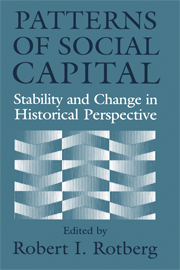Book contents
- Frontmatter
- Contents
- Introduction Social Capital and Political Culture in Africa, America, Australasia, and Europe
- Articles
- Civic Traditions in Premodern Italy
- The Sources of Civil Society in Italy
- Finding Social Capital: The French Revolution in Italy
- Social Capital in the Early Industrial Revolution
- The Diversity of Social Capital in English Communities, 1300–1640 (with a Glance at Modern Nigeria)
- Social and Cultural Capital in Colonial British America: A Case Study
- The Growth of Voluntary Associations in America, 1840–1940
- Civil Society as Democratic Practice: North American Cities during the Nineteenth Century
- Securing Political Returns to Social Capital: Women's Associations in the United States, 1880s–1920s
- Second-Generation Civic America: Education, Citizenship, and the Children of Immigrants
- Human Capital and Social Capital: The Rise of Secondary Schooling in America, 1910–1940
- From Local to National Political Cultures: Social Capital and Civic Organization in the Great Plains
Civility, Social Capital, and Civil Society: Three Powerful Concepts for Explaining Asia
Published online by Cambridge University Press: 12 April 2010
- Frontmatter
- Contents
- Introduction Social Capital and Political Culture in Africa, America, Australasia, and Europe
- Articles
- Civic Traditions in Premodern Italy
- The Sources of Civil Society in Italy
- Finding Social Capital: The French Revolution in Italy
- Social Capital in the Early Industrial Revolution
- The Diversity of Social Capital in English Communities, 1300–1640 (with a Glance at Modern Nigeria)
- Social and Cultural Capital in Colonial British America: A Case Study
- The Growth of Voluntary Associations in America, 1840–1940
- Civil Society as Democratic Practice: North American Cities during the Nineteenth Century
- Securing Political Returns to Social Capital: Women's Associations in the United States, 1880s–1920s
- Second-Generation Civic America: Education, Citizenship, and the Children of Immigrants
- Human Capital and Social Capital: The Rise of Secondary Schooling in America, 1910–1940
- From Local to National Political Cultures: Social Capital and Civic Organization in the Great Plains
Summary
Many knowledgeable people believe that developments in East and Southeast Asia will vindicate the theory that successful economic growth can set the stage for political democracy. Two decades of rapid economic growth there hold out the promise that the arrival of democracy may not be far behind. First Japan and then South Korea and Taiwan broke from their one-party, authoritarian traditions to become plausible democracies. Their achievements have given hope that China and the economically developing Southeast Asian countries will follow the same path. Such, after all, was the implicit expectation in much of modernization theory, including the assumption that foreign economic aid would, by facilitating economic development, prepare the way for transitions to democracy.
Current practices from Singapore to Beijing, however, are a cause for concern. Not only have there been no smooth transitions from economic to political change in these countries, but numerous Asian leaders are now insisting that such a sequence is neither inevitable nor desirable. In contrast to the dominant thinking in Asia during the first two-thirds of the twentieth century that these societies had to take on new values in order to make both economic and political progress, voices there now are proclaiming that “Asian values” are different from Western ones, and that economic growth can occur without the individualism associated with pluralistic democracy.
In the light of these concerns, it becomes reasonable to reconsider judgments about the character of democracy in Japan, South Korea, and Taiwan since it is still seen as an exceptional event for an opposition party in even those supposedly democratic countries to come to power.
- Type
- Chapter
- Information
- Patterns of Social CapitalStability and Change in Historical Perspective, pp. 375 - 394Publisher: Cambridge University PressPrint publication year: 2000
- 1
- Cited by



